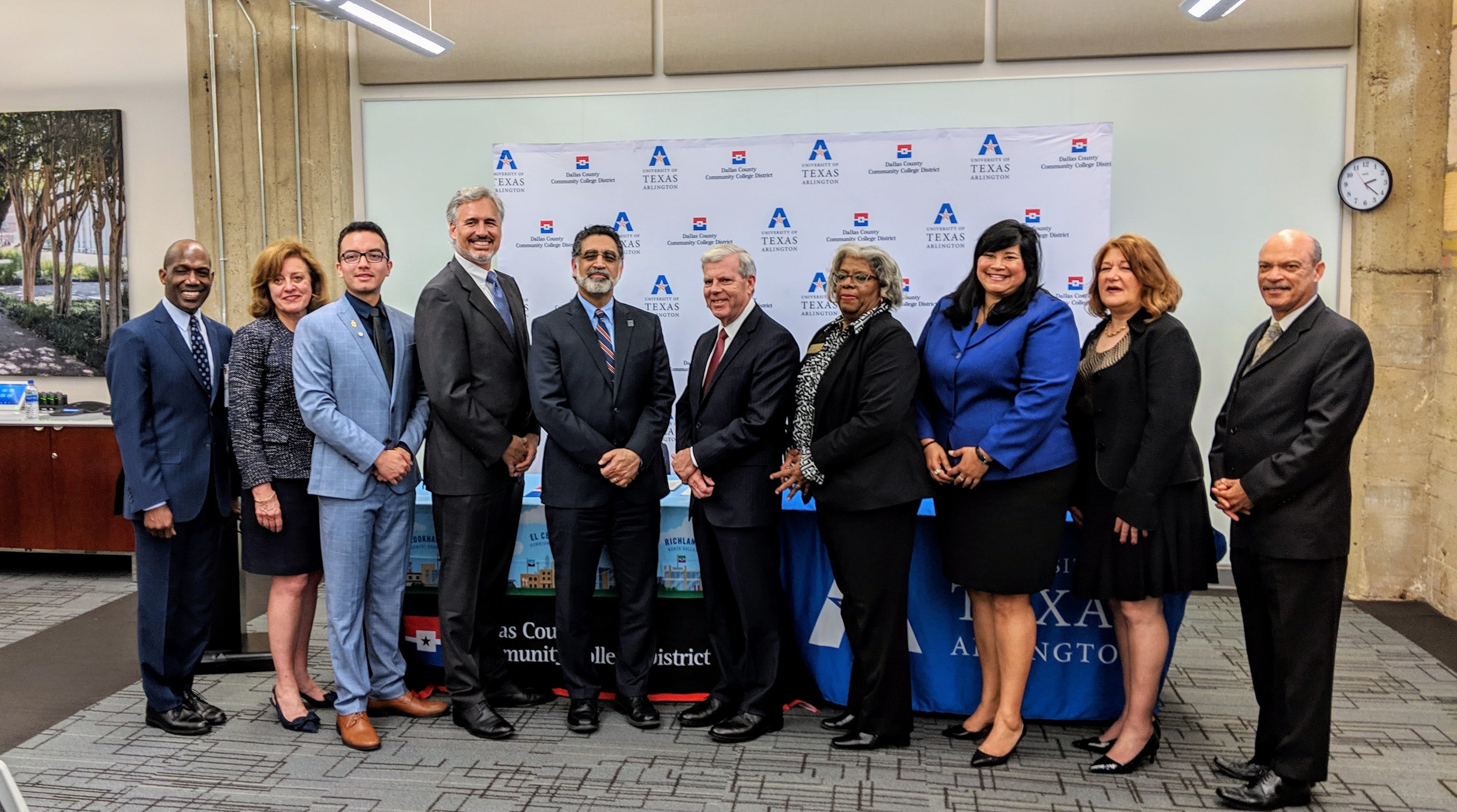UTA and DCCCD sign enhanced agreement to increase success of transfer students

The University of Texas at Arlington and Dallas County Community College District have signed an agreement that substantially enhances their existing partnership and further eases pathways for students transferring to UTA, the two institutions announced Friday.
The main goals are to provide greater avenues for the seamless transition of DCCCD students to continue their studies at UTA through structured pathways fostered by early advising and data sharing, with a focus on ensuring effective transferability and a greater emphasis on supporting students to assure their success.
The agreement enhances the existing collaboration among UTA and DCCCD’s seven campuses: Brookhaven, Cedar Valley, Eastfield, El Centro, Mountain View, North Lake and Richland colleges. UTA, the top destination point for DCCCD students, had 2,214 students enrolled from those schools in fall 2018.
UTA President Vistasp Karbhari said he wants DCCCD students to feel assured that UTA will provide a supportive environment and that each student will be welcomed into the Maverick family.
“UTA is already the university of choice for Dallas County Community College District students, and we are committed to further streamlining transfer pathways through our relationship with DCCCD to increase affordability and enhance degree progression and student success,” Karbhari said. “Our partnership with DCCCD benefits the entire State by ensuring seamless pathways for students, thereby making true transferability a reality in the North Texas region. This ultimately not only ensures better social mobility but also that DCCCD and UTA meet their commitment to our great State through the graduation of academically prepared and talented workforce-ready students.”
DCCCD Chancellor Joe May said the college district will benefit from its renewed agreement with UTA by offering its students seamless pathways to a four-year degree.
“We want all students in the Dallas County Community College District to follow a higher education pathway that takes them smoothly from high school to one of our colleges and forward to four-year institutions where they can complete their bachelor’s degrees. Renewing DCCCD’s transfer agreement with UTA is an important step along that pathway,” May said. “DCCCD, UTA and other colleges and universities across Texas are working together to ensure student success by creating seamless transfer agreements to help them achieve their goals.”
Both UTA and DCCCD are committed to achieving the goals of the state’s 60x30TX campaign, which was launched in 2015 and calls for at least 60% of Texans ages 25-34 to have a certificate or college degree by 2030.
UTA is ranked No. 1 in Texas and No. 3 nationally in the number of transfer students enrolled, according to U.S. News & World Report.
Troy Johnson, UTA vice president for enrollment management, said supplying a steady stream of highly skilled students equipped with degrees is part of keeping the workforce healthy and strong.
“Research shows that a person with a bachelor’s degree can earn nearly double the lifetime wages of a high school graduate, so completion is essential to the economic well-being of the state,” Johnson said.
New aspects of the agreement include:
- Enhanced transition services for high-achieving students applying to the UTA Honors College
- In-depth and comprehensive advising for specific disciplines while students are still at DCCCD
- Reverse transfer articulation, so DCCCD campuses can account for progress to the completion of associate degrees
Andres Lesmes transferred from DCCCD’s Mountain View College campus to UTA, which he says “has kept me growing professionally and personally.”
“I transferred to UTA because it offered international business as a major,” said Lesmes, who works at UTA’s Center for Mexican American Studies. “The UTA experience has been great. It excited me when I started realizing that I’ll make new connections and new friends.”
Lesmes said the opportunities UTA presented were simply too great to ignore.
“The Lockheed Martin Career Center helped a lot,” he said. “The staff taught me what I needed, how to create my resume and how to conduct interviews. It all helps.”